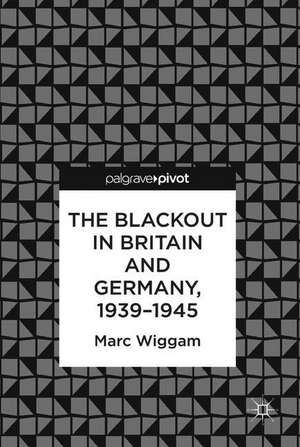The Blackout in Britain and Germany, 1939–1945
Autor Marc Wiggamen Limba Engleză Hardback – 19 iun 2018
Preț: 417.68 lei
Nou
Puncte Express: 627
Preț estimativ în valută:
79.93€ • 81.86$ • 66.49£
79.93€ • 81.86$ • 66.49£
Carte tipărită la comandă
Livrare economică 18 martie-01 aprilie
Preluare comenzi: 021 569.72.76
Specificații
ISBN-13: 9783319754703
ISBN-10: 331975470X
Pagini: 133
Ilustrații: XIII, 131 p.
Dimensiuni: 148 x 210 mm
Greutate: 0.33 kg
Ediția:1st ed. 2018
Editura: Springer International Publishing
Colecția Palgrave Pivot
Locul publicării:Cham, Switzerland
ISBN-10: 331975470X
Pagini: 133
Ilustrații: XIII, 131 p.
Dimensiuni: 148 x 210 mm
Greutate: 0.33 kg
Ediția:1st ed. 2018
Editura: Springer International Publishing
Colecția Palgrave Pivot
Locul publicării:Cham, Switzerland
Cuprins
1. Introduction.- 2. Planning.- 3. Adherence.- 4. Fear and Transgression.- 5.Working.- 6. Conclusion.- 7. Bibliography.- Index.
Notă biografică
Marc Wiggam researches communication history and the legitimation of state authority. He is co-author of British Press in the Second World War (forthcoming) and is currently working on another book on the British Ministry of Information.
Textul de pe ultima copertă
This book is the first major study of the blackout in the Second World War. Developing a comparative history of this system of civil defense in Britain and Germany, it begins by exploring how the blackout was planned for in both countries, and how the threat of aerial bombing framed its development. It then examines how well the blackout was adhered to, paying particular regard to the tension between its military value and the difficulties it caused civilians. The book then moves on to discuss how the blackout undermined the perception of security on the home front, especially for women. The final chapter examines the impact of the blackout on industry and transport. Arguing that the blackout formed an integral part in mobilising and legitimating British and German wartime discourses of community, fairness and morality, the book explores its profound impact on both countries.
Caracteristici
Provides the first book-length comparative social history of the black-out in Britain and Germany Offers new insights into the effect of the black-out on crime, working conditions, the operation of industry and ideas of space Utilises a wide range of sources including newspapers, diaries, and intelligence gathered by the German secret police
